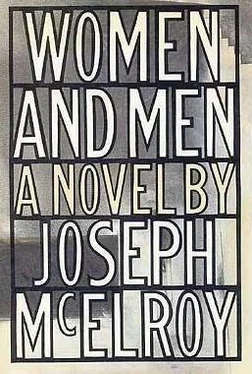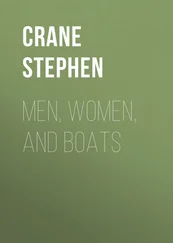And when Mayn asked what were the other sounds, the bartender said with a frown, "It was the pounding he mentioned."
But no, it wasn’t. "You know the pounding," Spence had said.
"Horses’ hoofs," said the bartender.
"Oh man, she was beautiful," said Spence, "but she was angry. I stay clear of angry people."
Pulling the bartender’s leg surely. But if the tale was true, say the pounding was Spence himself. Does a man with speckled hands have a heart? If so, the tale had left in Spence more than a smile accelerating down a highway in the wrong direction as if the blonde had commandeered a car and left her lama boyfriend holding two bags. The horses (spared or not) weren’t just one of the seven American winds, and Spence was no touring humorist, he meant something; the speckles all over the backs of his hands looked scaled but as if scabs had melted back into the glistening skin.
"Your golf course next to the cemetery, the cemetery next to the race track!" Joy said.
Mayn felt his heart surface. "The race track? What track? He didn’t say a track."
Mayn found the scissor point upon his temple. Joy would tell Lucille for sure, and he could see Lucille’s hair, a lock, come down over her forehead as she lit a cigarette and listened. She called them two hundred percent married. He recalled Spence once telling one of his own stories back to him, a guy who was Bob Yard’s niece’s friend by marriage whose shoes had hurt so much that he hadn’t gone out onto the Lakehurst airfield with the other newsmen for the Hindenburg mooring, and when the silver bag let out its potential fire and blew but not sky-high and somewhere a radiocaster was crying, this man with tight shoes who hadn’t gone out onto the strip had a headstart on everyone else getting to the phone.
"What’s Spence doing in your old backyard?" said Joy, who didn’t know Spence. Her hand was smoothing, smoothing, as if thinking, but not about the haircut. Call his cemetery a backyard? There’s a distance and he’s nearly there in Jersey in the town where he grew up. Cemetery, race track, mere coincidence.
Mayn thought, "I’m crazy, I can’t help asking again." And he said — but without turning to look at his wife with all those years of cut hair around them—"But you know what I was thinking."
"Oh I suppose, Which were the names Spence was looking for? because maybe they’d mean something to you, does Spence do that kind of thing?" Joy’s hand ruffles the back hair upwards, then smooths it down and lightly left to right.
He said, "I know you hate newspaper work, you do." "Just what I was thinking — but the names that Spence was after?" "It crossed my mind," he said, "but I don’t know any unmarked grave, but I was thinking, Was the fellow in the real mausoleum or did Spence make him up?"
Mayn did not ask to be caught up on what he’d missed, but you couldn’t tell if the bartender was falling for something or Spence himself had fallen into some unexpected field of the cemetery — Mayn hadn’t words for this likelihood — a field — a field of pounding inside the Earth (O.K.). Who was it said the Earth was the roof of hell?
Mayn, when they had met after the U-2, had thought he wouldn’t want to get drunk with a man whose mood jumped back and forth (let alone the speckled hands) from these little stories say of the Chicago wire service (AP had he said?) borrowing the weather off a radio station and then selling it back to the station, from the cozy, maybe-it’s-the-end-of-the-world-tomorrow interrogation of others as to facts he seemed already to know, to an inquisitive fear one night seeking Mayn’s eyes out while plucking the mouth with the speckled fingers (God, were the tips speckled? he didn’t remember and maybe he had been drunk, so a past he didn’t recall was why he told himself that he would never do any serious drinking with this adroit, neutral, orphan man whose curved fingers plucked at his lips) as if to tempt out the idiotic rage Spence (neutral?) had betrayed in Washington the night of the U-2: it was the camera’s beam, that’s what it was, the reconnaissance plane is beam of laserlike (well) venom multiplying down altitude upon altitude (but upon Russia!): so Mayn had felt drawn into that cemetery. Well hell! so what if no one least of all Mayn talked lasers in ‘60.
He told that whole story to his barber. "You know what I was thinking?" he asked to the wall in front of him, feeling the cool blade rub down off hair onto skin.
"Oh my God!" Joy said, thinning the sideburn near the earlobe.
"What?"
"And right now you’re thinking, How did you manage not to guess Spence was talking about your own hometown."
What happened then was that — his head whipping round toward her— no music, it happened without music since the last record had finished — his head came about so suddenly that he thought, How could I not have been afraid to lose my eye, for where would the scissors be? And he heard Joy cry out — at maybe his anger that she’d heard his story better than he had — though she had made him feel, yes, not alone; but no, she had cried out because of what she had done to herself, she’d pulled back the scissor point as her left hand came across and he turned — and her left hand like a padding had followed the scissors faster than they jumped back, and the palm of that left hand caught the point with a surprise as sharp as the medic’s detonating prick in the pad-tip of the middle finger for a blood test now no longer jabbed in the finger.
"Hey," so quiet he had surprised himself; and he took her hand and licked it almost before his eyes could see the thick point of blood there. Kissed her hand as her nails clawed in against his cheek and he stuck out his tongue and touched blood.
The music from the other room seemed long gone.
He had a hair on his tongue, which she did not know about.
But he’d already found the thing in her palm.
It was the future he’d been living in and coming back from. He would like to tell his son someday, but his son would believe it too easily.
"In future," his father had said at bedtime after Bob Yard and the newspaperman with all the stories had gone, "you will not be eavesdropping under the porch when I have visitors." But Jim had been there first. Under the porch. Just there, not waiting for anything, much less some bald-headed visitor talking about death and about trotters, methods of execution, evidence and verdicts— rendering a verdict, the word was. His father had it all turned around, there’d been no eavesdropping.
His father did not hit him.
A slap might have been a relief, a kick from one of those shoes scraping overhead in place of that punishing tone you couldn’t quite see. A punishing race, the local paper reported.
Mayn tasted blood, but he was in Joy’s body looking from that future he habitually came back from. Came back to this marriage even as now with the salt of the blood sequencing to him he wanted to tell her but did not dare feel the reaction he’d get from this smart person, tell her that as the holding pattern at the end of his latest trip went on he had for a while not known where he had been — that is, where he’d had a quick shower and breakfast; that is, where he had Departed from (with a capital DEP) — so he’d squeezed a hand into his pants pocket to find the ticket, and seeing Springfield he then found next to to (next to three or four to’s) the typed word void, and he started to show it to the woman in the window with its tight shade down against the New York afternoon sun just as he caught her eye and he wished Joy could observe her.
And in the blood that clung to his tongue — moist to moist — (so his tongue felt creepy sprouting), he knew that he would give up, he and Joy; they would do it together, that is give up, as staringly as he had once said to Flick alone, because he didn’t want Andrew to hear, that he didn’t blame their mother for feeling him impossible to live with — so smoothly said that the girl answered with a diplomacy of her own smoothness to say that that wasn’t true — definitely, you know, not true.
Читать дальше












